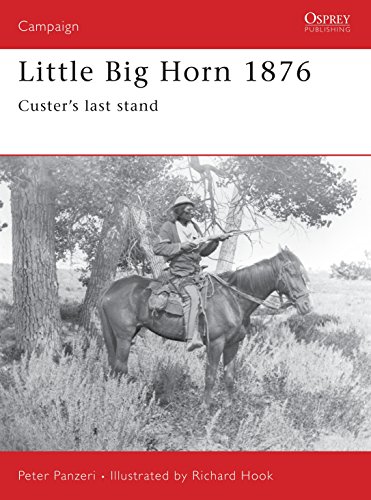Little Big Horn 1876
Custer's Last Stand (Campaign, 39)
Peter Panzeri
BOOK REVIEW

In the annals of American history, the Battle of Little Bighorn stands as a cataclysmic encounter, a moment when fate was decided not by mere strategy but by raw courage and tragic hubris. Little Big Horn 1876: Custer's Last Stand by Peter Panzeri serves as a critical lens through which we can dissect this pivotal clash-a narrative interwoven with the fierce spirit of Indigenous tribes and the reckless march of General George Armstrong Custer.
This narrative does not merely recount the chronological events leading up to the fateful day in June 1876; it invites you to experience the visceral emotions that enveloped this battlefield. Panzeri's writing unearths the undercurrents of desperation, valor, and betrayal as Custer led his men into what many would term the ultimate quagmire of misjudgment. The pages resonate with the echoes of gunfire and the heartbeats of soldiers and Native warriors alike, igniting an emotional turmoil that is both compelling and heart-wrenching.
What makes Panzeri's work stand out is not just the retelling of Custer's last stand, but a plunge into the cultural dynamics and the ramifications of this encounter. The author reconstructs a tableau of determination on the part of the Lakota and Cheyenne people, who emerged not just as combatants but as defenders of their land and way of life. This wasn't just a battle between armies; it was a clash of civilizations, beliefs, and destinies.
Throughout the book, readers are thrust into the chaos of warfare, feeling the adrenaline as the battle unfolds. You are there, shoulder-to-shoulder with Custer's men, grappling with their misplaced confidence and lack of understanding of the Indigenous forces arrayed against them. The shocking miscalculation of a leader considered invincible becomes painfully clear, inviting a tumult of emotions ranging from sympathy to incredulity.
The commentary surrounding this book highlights its impact. Readers have praised Panzeri for illuminating the complexities of this historical moment while also critiquing the overly romanticized portrayals of Custer. Some argue the narrative leans too heavily into the myth-making of the "last stand," overshadowing the voices of the Indigenous participants. However, this duality in perspective is precisely what enriches the text, encouraging an examination of history from diverse angles.
As you immerse yourself in this poignant retelling, you confront a larger question: What does it mean to face one's fate? The tragic end of General Custer is not just a moment of downfall; it serves as a mirror reflecting our own encounters with arrogance and the sudden, sobering realization of our limitations. This is a battle that reshaped not only a nation's identity but also sparked dialogues that persist today about legacy, resilience, and justice.
Thus, Little Big Horn 1876: Custer's Last Stand is not simply a work of military narrative; it is a vibrant portrayal of conflict, deeply human in its exploration of ambition, pride, and the consequences of misjudgment. It compels you to reflect on our history and its lingering effects, stirring an insatiable thirst for understanding the complex tapestry of America's past. Dive in, and prepare to rearrange the pieces of what you think you know about this monumental event.🌍✨️
📖 Little Big Horn 1876: Custer's Last Stand (Campaign, 39)
✍ by Peter Panzeri
🧾 96 pages
1995
#little #horn #1876 #custers #last #stand #campaign #peter #panzeri #PeterPanzeri